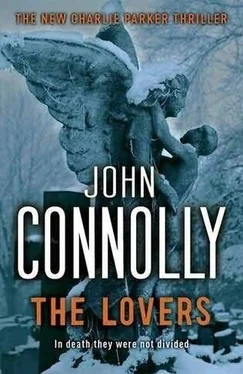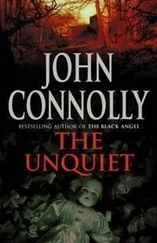John Connolly - The Lovers
Здесь есть возможность читать онлайн «John Connolly - The Lovers» весь текст электронной книги совершенно бесплатно (целиком полную версию без сокращений). В некоторых случаях можно слушать аудио, скачать через торрент в формате fb2 и присутствует краткое содержание. Жанр: Триллер, на английском языке. Описание произведения, (предисловие) а так же отзывы посетителей доступны на портале библиотеки ЛибКат.
- Название:The Lovers
- Автор:
- Жанр:
- Год:неизвестен
- ISBN:нет данных
- Рейтинг книги:4 / 5. Голосов: 1
-
Избранное:Добавить в избранное
- Отзывы:
-
Ваша оценка:
- 80
- 1
- 2
- 3
- 4
- 5
The Lovers: краткое содержание, описание и аннотация
Предлагаем к чтению аннотацию, описание, краткое содержание или предисловие (зависит от того, что написал сам автор книги «The Lovers»). Если вы не нашли необходимую информацию о книге — напишите в комментариях, мы постараемся отыскать её.
The Lovers — читать онлайн бесплатно полную книгу (весь текст) целиком
Ниже представлен текст книги, разбитый по страницам. Система сохранения места последней прочитанной страницы, позволяет с удобством читать онлайн бесплатно книгу «The Lovers», без необходимости каждый раз заново искать на чём Вы остановились. Поставьте закладку, и сможете в любой момент перейти на страницу, на которой закончили чтение.
Интервал:
Закладка:
My mother immersed herself in the life of the town. If there was a committee, she joined it. For a woman who, in most of my early memories of her, seemed so self-contained, so distant from her peers, it was an astonishing transformation. My father probably wondered if she was having an affair, but it was nothing more than the reaction of someone who found herself in a better place than she had previously been, with a husband who was more contented than he’d been before, although she still fretted when he left the house each day, and responded with barely concealed relief when he returned home unharmed after each tour.
My mother: now, as I trawled through the details of our life in that place, my relationship with her began to seem less and less normal, if that word can ever truly be used about the interactions of families. If she had sometimes appeared disconnected from her peers, so too was she often at one remove from my father, and from me. It wasn’t that she withheld affection, or did not cherish me. She delighted in my triumphs, and consoled me in my defeats. She listened, and counseled, and loved. But it seemed to me that, for much of my childhood, she acted in response to my promptings. Ifh t�omptings. I came to her, she would do all of those things, yet she did not initiate them. It was as though I were an experiment of sorts, a creature in a cage, something to be monitored and watched, to be fed and watered and given the affection and stimulation to ensure my survival, yet no more than that.
Or perhaps that was just a game memory was playing on me as I churned up the mud in the reservoir of the past and, when the dirt had settled, picked my way across the bottom to see what had been exposed.
After the killings, and what followed, she fled north to Maine, taking me with her, back to the place in which she had grown up. Until she died, when I was still in college, she refused to discuss in any detail the events that had led up to my father’s death. She retreated into herself, and there found only the cancer that would take her life, slowly colonizing the cells of her body like bad memories canceling out the good. I now wonder how long it had been waiting for her, if grave emotional injury might somehow have triggered a physical response, so that she was betrayed on two fronts: by her husband, and by her own body. If that was so, then the cancer began its work in the months before I was born. In my way, I was the stimulus as much as my father’s actions, for one was a consequence of the other.
The house had not changed much, although crumbling paintwork, upper windows streaked with grime, and broken shingles like dark, chipped teeth spoke of a degree of neglect. The color was slightly different, a paler gray than it had been when I lived there, but the yard was still unfenced, like those of the rest of its neighbors. The porch had been screened since last I had seen it, and a rocking chair and a rattan couch, both bare of cushions, faced the street. The window and door frames were now painted black instead of white, and there was only lawn where once there had been carefully tended flower beds, the grass thin and straggling where it was visible through banked and frozen snow, yet this was still recognizably the place in which I had grown up. A drape moved in what used to be the living room, and I saw an old man staring curiously at me. I dipped my chin in acknowledgment of his presence, and he receded into the shadows.
Above the front door was a double window, one pane broken and patched with cardboard, where a boy would sit and gaze out at the small town that was his world. Something of myself had been left in that room after my father died: a degree of innocence, perhaps, or the last remnant of childhood. It had been taken from me in the sound of a gunshot, forcing me to shed it like a reptile skin, or the pupal shell of an insect. I could almost see him, this little ghost: a figure with dark hair and narrow eyes, too introspective for his age, too solitary. He had friends, but he had never overcome the feeling that he was imposing upon them when he called to their houses, and that they did him a favor by playing games with him, or inviting him inside to watch TV. It was easier when they went out as a gang, playing softball in the park in summer, or soccer if Danny Yates, who was the only person he knew who was enthusiastic about the Cosmos and had Shoot! magazine sent over to him by an uncle stationed with the air force in England, was back from summer camp, or had yet to leave. Danny was older than the rest of them by a couple of years, and they deferred to him in most things.
I wondered where most of those former friends were now (none of them black, for Pearl River was a lily-white town, and we only encountered black kids at varsity games). I had lost touch with them after we left for Maine, but some were probably still living here. After all, Pearl River -clannish, fiercely protective of its own-was the kind of in� the kind place that became home to generations. Bobby Gretton had lived two doors down on the other side of the street. His parents drove only Chevys, and kept each car for a maximum of two years before trading it in for a newer model. I looked to my left and saw a brown Chevy Uplander in the drive of what had always been the Gretton house. There was a fading bumper sticker on the rear of the car supporting Obama for president in ’08, and beside it a yellow ribbon. The car had veterans’ plates. That was Mr. Gretton for sure.
The light changed at my old bedroom window, a cloud scudding overhead giving the impression of movement within, and I felt again the presence of the boy I once was. There he sat, waiting for the first sight of his returning father, or perhaps a glimpse of Carrie Gottlieb, who lived across the street. Carrie was three years older than he, and generally considered to be the most beautiful girl in Pearl River, although there were those who whispered that she knew it too, and that that knowledge made her less attractive and personable than other, more modestly endowed and self-effacing young women. Such mutterings did not concern the boy. It did not concern many of the boys in town. It was Carrie Gottlieb’s very separateness, the sense that she walked through life on pedestals erected solely for her own purposes, that made her so desirable. Had she been more down-to-earth and less self-assured, their interest in her would have been considerably diminished.
Carrie went off to the city to become a model. Her mother would tell anyone who stood still for long enough about how Carrie was destined to adorn fashion spreads and television screens, but in the months and years that followed, no such images of Carrie appeared, and in time her mother stopped speaking of her daughter in that way. When asked by others (usually with a glint in their eye, sensing blood in the water) how Carrie was getting along, she would reply, “Fine, just fine,” her smile slightly strained as she moved the conversation on to safer ground or, if the questioner persisted, simply moved herself along instead. In time, I heard that Carrie came back to Pearl River and got a job as the hostess in a restaurant, eventually becoming the manager after she and the owner got married. She was still beautiful, but the city had taken its toll on her, and her smile was less certain than it once had been. Nevertheless, she had returned to Pearl River, and she bore the loss of her dreams with a certain grace, and people admired her for it, and maybe liked her a little more than before because of it. She was one of them, and she was home, and when she visited her parents on Franklin Avenue the ghost of a boy saw her, and smiled.
My father was not a big man compared to some of his fellow officers, barely making the NYPD’s height requirement and slighter in build than they were. To my boyhood self, though, he seemed like an imposing figure, especially when he wore his uniform, with the four-inch Smith & Wesson hanging on his belt, and his buttons gleaming against the deep, dark blue of his clothing.
Читать дальшеИнтервал:
Закладка:
Похожие книги на «The Lovers»
Представляем Вашему вниманию похожие книги на «The Lovers» списком для выбора. Мы отобрали схожую по названию и смыслу литературу в надежде предоставить читателям больше вариантов отыскать новые, интересные, ещё непрочитанные произведения.
Обсуждение, отзывы о книге «The Lovers» и просто собственные мнения читателей. Оставьте ваши комментарии, напишите, что Вы думаете о произведении, его смысле или главных героях. Укажите что конкретно понравилось, а что нет, и почему Вы так считаете.












